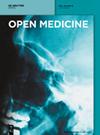地奥司钦通过TLR4/NF-κB途径预防慢性前列腺炎
IF 1.7
4区 医学
Q2 MEDICINE, GENERAL & INTERNAL
引用次数: 0
摘要
本研究旨在阐明体内和体外利奥霉素对慢性前列腺炎(CP)的影响和潜在机制。研究人员在体内和体外构建了慢性前列腺炎模型,并使用不同浓度的地奥司霉素进行治疗。采用苏木精和伊红染色法研究前列腺组织的形态。酶联免疫吸附试验测定了前列腺组织中炎症因子的浓度。使用检测试剂盒测定活性氧、丙二醛、超氧化物歧化酶和过氧化氢酶的释放。P69 细胞增殖通过 3-(4,5-二甲基噻唑-2-基)-2,5-二苯基溴化四氮唑进行评估。此外,TLR4/NF-κB 信号通路的活性是通过定量逆转录酶聚合酶链反应或 Western 印迹法测定的。组织病理学数据表明,地奥司馨对前列腺形态变化具有保护作用。地奥司馨以浓度依赖性方式抑制前列腺组织中的炎性细胞因子和氧化应激(OS)。此外,地奥司馨还能显著抑制 CP 大鼠体内 TLR4/NF-κB 信号通路的激活。在体外,迪奥霉素以剂量依赖的方式显著减少了脂多糖诱导的P69增殖、炎症、OS和TLR4/NF-κB通路的激活。总之,地奥司嗪通过TLR4/NF-κB途径降低炎症反应和OS,对CP具有保护作用。我们的研究结果为治疗和预防心绞痛提供了一种新型的地奥辛潜伏疗法。本文章由计算机程序翻译,如有差异,请以英文原文为准。
Dioscin protects against chronic prostatitis through the TLR4/NF-κB pathway
This study aimed to elucidate the effects and potential mechanisms of dioscin on chronic prostatitis (CP) in vivo and in vitro . CP models were constructed in vivo and in vitro and treated with different concentrations of dioscin. Hematoxylin and eosin staining was used to investigate the morphology of the prostate tissues. The concentration of inflammatory factors in prostate tissues was determined by enzyme-linked immunosorbent assay. The release of reactive oxygen species, malondialdehyde, superoxide dismutase, and catalase was measured using detection kits. P69 cell proliferation was assessed by 3-(4, 5-dimethylthiazol-2-yl)-2,5-diphenyl tetrazolium bromide. Furthermore, the activity of the TLR4/NF-κB signaling pathway was determined by quantitative reverse transcriptase polymerase chain reaction or Western blot assay. Histopathological data suggested that dioscin exerted protective effects against prostate morphological changes. Dioscin inhibits inflammatory cytokines and oxidative stress (OS) in prostate tissues in a concentration-dependent manner. Moreover, dioscin notably inhibited the activation of the TLR4/NF-κB signaling pathway in CP rats. In vitro , dioscin remarkably reduced lipopolysaccharide-induced P69 proliferation, inflammation, OS, and TLR4/NF-κB pathway activation in a dose-dependent manner. In conclusion, dioscin exerts a protective effect in CP by decreasing the inflammatory response and OS through the TLR4/NF-κB pathways. Our findings provide a novel latent therapy for dioscin for the treatment and prevention of CP.
求助全文
通过发布文献求助,成功后即可免费获取论文全文。
去求助
来源期刊

Open Medicine
Medicine-General Medicine
CiteScore
3.00
自引率
0.00%
发文量
153
审稿时长
20 weeks
期刊介绍:
Open Medicine is an open access journal that provides users with free, instant, and continued access to all content worldwide. The primary goal of the journal has always been a focus on maintaining the high quality of its published content. Its mission is to facilitate the exchange of ideas between medical science researchers from different countries. Papers connected to all fields of medicine and public health are welcomed. Open Medicine accepts submissions of research articles, reviews, case reports, letters to editor and book reviews.
 求助内容:
求助内容: 应助结果提醒方式:
应助结果提醒方式:


